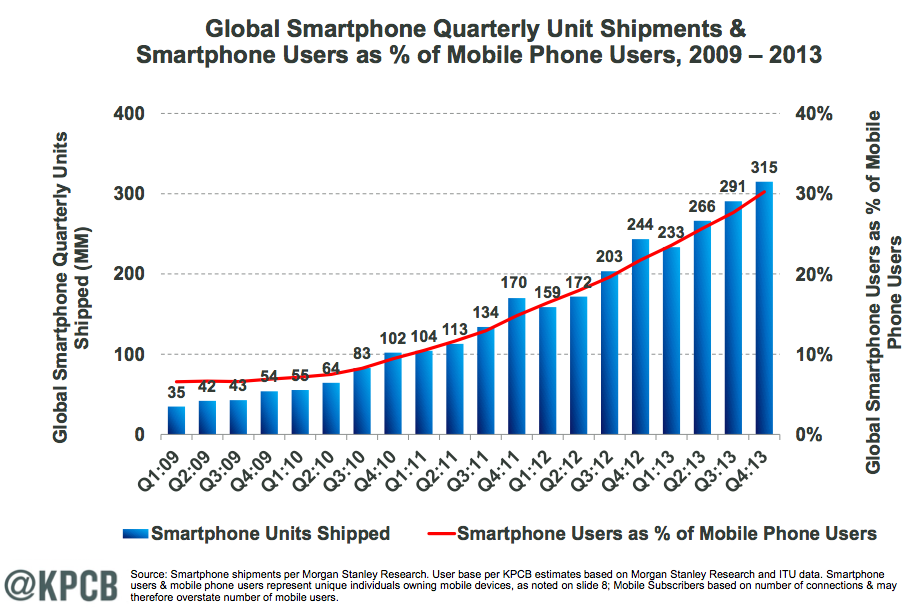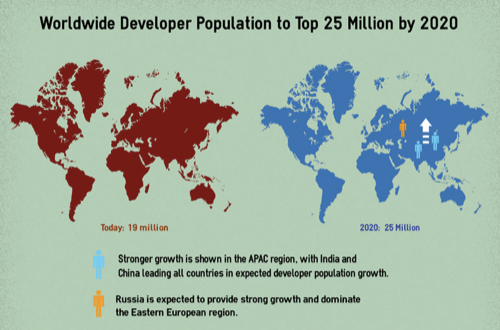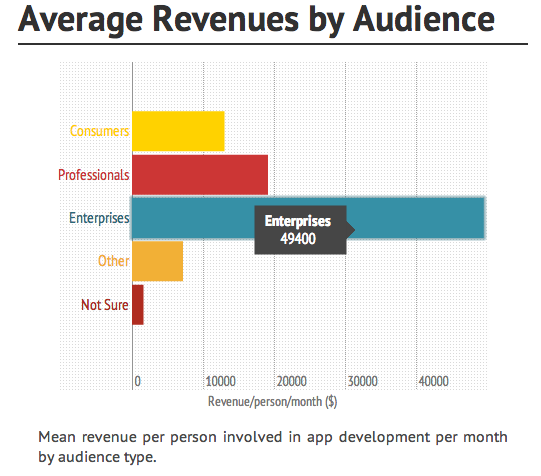App developers are a pragmatic bunch, spending their time wherever they believe the biggest paycheck will hit. While that used to be the desktop, nearly half the global developer population is now focused on building mobile applications. True to form, these developers aren’t necessarily chasing consumer applications, but instead are skewing their efforts to more assured revenue channels like enterprise development, as a new Evans Data developer survey suggests.
Mobile Is Eating The Developer Population
According to Evans Data’s recently released Developer Population and Demographics Study, of the 19 million software developers in the world, 8.7 million are now writing apps targeted for mobile devices. That number becomes even more impressive when we consider that the mobile developer population has doubled since 2010 and added 700,000 new developers in 2013.
With smartphone shipments booming and showing no signs of abating their pace—as Mary Meeker’s Internet Trends 2014 report details—expect the mobile developer population to grow in tandem.

Where are these developers? Regionally, Asia-Pacific region leads with about 46% more developers focused on mobile than the Europe, Middle East and Africa (EMEA) region, which includes Russia. Latin America lags behind those regions and North America in its mobile developer population.

And who are they? Here’s some good news: the number of female developers has boomed by 87% since 2001, totaling nearly 3.5 million developers today, a significant percentage of which targets mobile.
Boring, Profitable Enterprise Development
More women. More developers in Asia-Pacific. And … more enterprise app development.
See also: Why Mobile Developers Are Really Starting To Embrace The Enterprise
Given widespread mobile adoption, it’s not surprising that mobile developers aren’t focused on the least profitable segment of mobile development (consumer apps), as Janel Garvin, CEO of Evans Data Corp., notes:
People who think that mobile developers are only developers who sell apps through app stores are seeing just a small part of the overall picture. Mobile development is becoming ubiquitous thanks to the prominence of mobile devices as the preferred client in both enterprise and consumer environments.
So, if they’re not writing the next Flappy Bird (incidentally, built by a developer in Vietnam), what are these developers writing? Boring, safe enterprise apps.
Building mobile apps for the enterprise is not exactly a new trend. In the past two years, many mobile developer have seen the enterprise as a more stable source of revenue, with a ton of room to grow. As I’ve written before, enterprise developers stand to make four times as much money building mobile apps than consumer-oriented developers do, according to research from VisionMobile.

This shift is having a multiplier effect on mobile developers’ paychecks. If you multiply the average revenue per developer by the average size of development team for mobile and enterprise application development, using VisionMobile’s data, enterprise-oriented development teams make 16-times more revenue than consumer-oriented development teams.
Death Of The Consumer?
Consumer apps aren’t dead. Not by a longshot. While the future belongs to mobile app developers, and those developers are likely to skew enterprise in order to pay their rent, we’re not going to see an evaporation of interest in building consumer apps. While desktop development favored dullsville enterprise apps for decades, plenty of games and other consumer-oriented apps still got written.
The more interesting story, however, is the kind of consumer and enterprise applications that will be built. With more women joining the mobile developer workforce, it’s likely that we’ll see a different flavor of both consumer and enterprise apps.
The same is true of the heavy balance of APAC developers, particularly in China. While we tend to laud the pace and innovation of Silicon Valley, I spoke recently to a veteran of Silicon Valley startups who just returned from nine years in Beijing, where he started and sold a few companies. According to him, China’s startup economy puts Silicon Valley to shame in both its level of competition and how hard people are willing to work to win. Chinese mobile entrepreneurs have innovated both on the business model side, as The Wall Street Journal has reported, but also in technical innovation.
In other words, mobile puts very different developer populations to work and we’re likely to get an incredibly diverse, rich mobile ecosystem as a result.
Image courtesy of Shutterstock.









